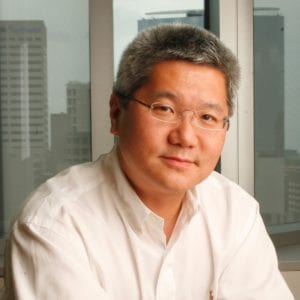
Robert and Janice McNair Endowed Chair and Professor of Molecular and Human Genetics
Baylor College of Medicine
Secretary, ASHG Board of Directors
2016 ASHG Curt Stern Award recipient
Dr. Lee’s research program focuses on human inborn errors of metabolism and structural birth defects.
He shared his perspective on balancing research and the clinic, the importance of quantitative science, and the role his mentors played in shaping his present career.
ASHG: What are specific challenges faced by clinicians who also want to have a research career in genetics?
Lee: The application of new genetic information medicine is advancing at a dizzying pace. One could argue that genetic medicine is the most rapidly advancing field compared to other medical fields. This puts a higher burden on the clinical geneticist and medical biochemical geneticist to keep abreast of knowledge and to apply it to the care of their patients. It also puts additional stress on trying to establish a competitively funded research career.
Having said this, research arguably makes a clinical geneticist better by keeping him/her on the cutting edge of science and the approach to care. In this way, many successful physician-scientists are specializing while aligning their clinical practice with their research. I have certainly done this, focusing my clinical practice on skeletal dysplasias and metabolic disorders like urea cycle disorders.
Of course, to do so predicates a clinical practice with sufficient practitioners to have experts in all things, something not found frequently in the current practice environment.
ASHG: If you could go back to when you were a trainee, what is one piece of advice you would give yourself for your current career?
Lee: I think that in growing up in the advent of molecular biology, there was little stress on quantitative sciences like statistics and computational sciences. There is no doubt that the current field of genetics, including experimental genetics, is increasingly driven by a quantitative approach that includes informatics and big data. I would recommend all trainees to not ignore this aspect of training even, if their goals were in experimental genetics.
ASHG: What are your favorite and least favorite parts of your job?
Lee: The most exciting aspect of genetics will always be the discovery of how natural mutation causes disease and in so doing, informing about a basic rule of biology. The next patient walking into clinic could be the beacon to a great discovery. Increasingly, the least favorite part of the job is the increasing bureaucracy and paperwork burden related to healthcare.
ASHG: How important do you think it is to have a mentor in your field? What do you think are important qualities in an effective mentor?
Lee: Irrespective of field, all of us need mentors. Moreover, we need mentors at every level. I think the most important quality of a mentor is to be able to identify and provide what every mentee needs most- and this special quality is different for each.
In this way, there really isn’t a dogmatic approach to being a great mentor. At some level, each mentee is a “problem” and a good mentor will provide a solution based on the needs of that problem. The solution is of course to advance the mentee in areas of performance – professional, social, personal, and otherwise – that will facilitate their shared definition of success.
Want more interviews? Join the ASHG Trainee Forum to keep up with new ones!
